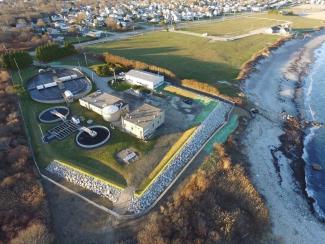DEM, RI Infrastructure Bank Solicit Communities to Apply for Financial Assistance for Water Improvement Projects
Published on Tuesday, March 28, 2023
PROVIDENCE, RI – The Department of Environmental Management (DEM) and Rhode Island Infrastructure Bank (RIIB) are encouraging Rhode Island communities that have identified needed water quality improvement projects to submit them for inclusion on DEM’s fiscal year 2024 project priority list (PPL). The DEM Office of Water Resources is reminding the public that such projects must be submitted by Friday, March 31, to be considered for favorable Clean Water State Revolving Fund (CWSRF) financing within the next 24 months. DEM maintains the PPL and RIIB, which administers the CWSRF, uses the PPL to make its financing decisions.
Enacted in November of 2021, the Infrastructure Investment and Jobs Act (AKA, the Bipartisan Infrastructure Law) delivered historic funding levels to repair and update the nation’s water infrastructure. Included in the overall $50 billion investment were identical $11.7 billion authorizations for drinking water and wastewater state revolving fund (SRF) programs. Millions of dollars of principal forgiveness are available for disadvantaged communities where affordability is an issue. Projects that treat emerging contaminants, such as PFAS (perfluoroalkyl and polyfluoroalkyl substances), also are eligible for 100% principal forgiveness. For RI officials, the message is clear: Now is the time for municipalities to invest in improving clean water infrastructure and the health of waterbodies.
“Thanks to the Bipartisan Infrastructure Law and the Inflation Reduction Act, Rhode Island will be receiving hundreds of millions of dollars in funding over the next four years for our Clean and Drinking Water State Revolving Funds, and other water related programs,” said Jeffrey Diehl, CEO of Rhode Island Infrastructure Bank. “A portion of these funds will also be available for principal forgiveness for projects located in disadvantaged communities. This is a once-in-a-generation opportunity to make major investments in our state’s clean and drinking water infrastructure, and we look forward to partnering with our municipalities and quasi-public partners to put these funds to work.”
“The Bipartisan Infrastructure Law provides the basis for SRF programs through September 30, 2026,” but this time will go by quickly,” said DEM Supervising Environmental Planner Jenny Paquet. “For this reason, we are encouraging municipalities to think broadly about their needs, plan for multiyear investments, and submit their projects to the priority list. Projects must be on the PPL to be considered for principal forgiveness and generous financing terms.”
The CWSRF program funds a wide array of water pollution abatement and water quality improvement projects. Eligible types of projects include:
- Projects to treat emerging contaminants, such as PFAS, microplastics, and pharmaceuticals in wastewater, stormwater, and nonpoint source pollution
- Wastewater infrastructure improvements including projects related to aging sewers, pump stations, and treatment facilities; projects that increase security at wastewater treatment facilities; and projects that extend sewers to polluted neighborhoods with failing septic systems
- Combined sewer overflow abatement
- Community on-site wastewater treatment system repair programs
- Holistic stormwater mitigation projects, particularly green stormwater infrastructure and nature-based solutions that restore natural hydrology and treat polluted runoff
- Restoration of degraded riverbanks, wetlands, floodplains, riparian buffers, or salt marshes
- Landfill closures
- Dam removal and stream connectivity restoration
- Projects that reduce the energy consumption needs of a wastewater facility via renewable energy and energy efficiency projects
- Projects that make wastewater infrastructure more resilient to the effects of climate change
- Planning and design for stormwater pollution abatement or wastewater capital projects (must be a reasonable expectation that the project will result in a viable capital project)
DEM is interested in increasing participation by entities planning projects related to stormwater pollution abatement, green infrastructure, non-point source pollution abatement, emerging contaminants, climate resiliency of water infrastructure, and particularly projects that benefit disadvantaged communities. DEM also is interested in wastewater infrastructure projects that systematically replace the oldest sections that are most vulnerable to failures.
To be included in the PPL, project descriptions must be submitted on a form provided by DEM. All projects will be rated and ranked according to criteria contained in the Rules and Regulations for the Priority Determination System for Federal and State Assistance for Construction of Water Pollution Abatement Projects (250-RICR-150-20-2).
Submission of a project for rating, ranking, and listing on the PPL does not obligate the applicant to go forward with the project but does ensure the ability to seek financial assistance via the CWSRF for that project at the appropriate time. DEM will rate and rank all submitted projects and formulate the PPL. A 30-day public notice regarding the PPL will be posted on the DEM’s website with the opportunity for public comment. Revisions may be made based upon comments received. The final PPL will also be posted on the DEM’s website.
If you have any questions, please email Jenny Paquet, 401-222-4700, ext. 277-7263. For more information on DEM programs and services, visit www.dem.ri.gov. Follow DEM on Twitter (@RhodeIslandDEM), Facebook, or Instagram (@RhodeIslandDEM).

